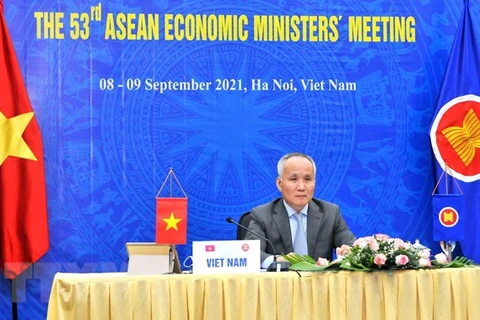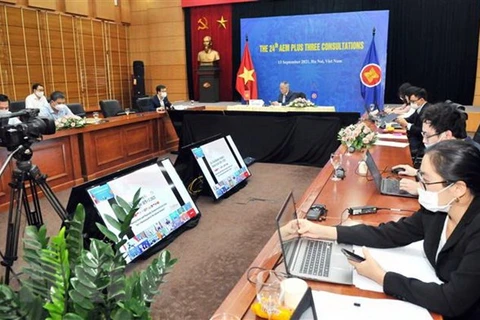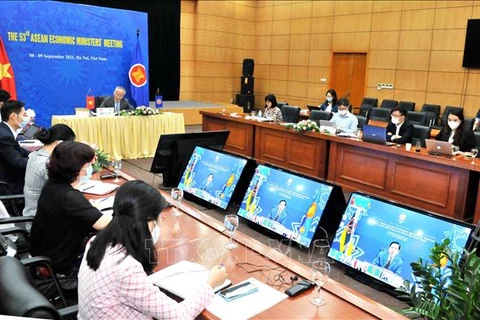Bangkok (VNA) - The ASEAN Economic Ministers (AEM) group is keen to upgrade existing free trade agreements (FTAs) and accelerate the enforcement of the Regional Comprehensive Economic Partnership (RCEP) trade pact among all members, aiming to revive the regional economy amid the COVID-19 pandemic.
Thailand’s Trade Negotiations Department Director-General Auramon Supthaweethum said the economic ministers are expected to discuss restoring the ASEAN economy amid the pandemic and strategies for economic relations with non-ASEAN countries at the 28th AEM Retreat, which is scheduled to take place on March 16-17 via video conference.
Cambodia, as chair of the meeting, wants all ASEAN members to work together to start negotiations to upgrade the ASEAN Trade in Goods Agreement and existing FTAs, especially the ASEAN-Australia-New Zealand FTA, and accelerate the enforcement of RCEP for all members, she said.
As the world's largest FTA measured by GDP, RCEP came into force early this year having been ratified by at least six ASEAN members and three other signatory countries. Among ASEAN members, only Indonesia, Myanmar and the Philippines have yet to submit their RCEP ratification to the ASEAN Secretariat.
Together, RCEP's 15 participants account for a combined population of nearly 2.3 billion (30.2 percent of the world's population), with 33.6 percent of the world's GDP and about 30.3 percent of global trade.
In 2021, the trade volume between Thailand and ASEN tallied 111 billion USD, up 17.1 percent from a year before.
Of the total, exports accounted for 65 billion USD, up 17.2 percent, and imports were valued at 45.8 billion USD, up 16.9 percent from 2020./.
Thailand’s Trade Negotiations Department Director-General Auramon Supthaweethum said the economic ministers are expected to discuss restoring the ASEAN economy amid the pandemic and strategies for economic relations with non-ASEAN countries at the 28th AEM Retreat, which is scheduled to take place on March 16-17 via video conference.
Cambodia, as chair of the meeting, wants all ASEAN members to work together to start negotiations to upgrade the ASEAN Trade in Goods Agreement and existing FTAs, especially the ASEAN-Australia-New Zealand FTA, and accelerate the enforcement of RCEP for all members, she said.
As the world's largest FTA measured by GDP, RCEP came into force early this year having been ratified by at least six ASEAN members and three other signatory countries. Among ASEAN members, only Indonesia, Myanmar and the Philippines have yet to submit their RCEP ratification to the ASEAN Secretariat.
Together, RCEP's 15 participants account for a combined population of nearly 2.3 billion (30.2 percent of the world's population), with 33.6 percent of the world's GDP and about 30.3 percent of global trade.
In 2021, the trade volume between Thailand and ASEN tallied 111 billion USD, up 17.1 percent from a year before.
Of the total, exports accounted for 65 billion USD, up 17.2 percent, and imports were valued at 45.8 billion USD, up 16.9 percent from 2020./.
VNA
























